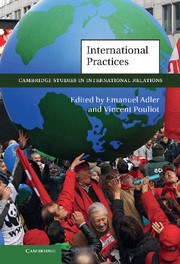Book contents
- Frontmatter
- Contents
- Figure
- Note on the contributors
- Acronyms and abbreviations
- Part I Practices in International Relations and social theory
- Part II Practices and their background
- Part III The evolution of practices
- 6 The practice of deterrence
- 7 Britain’s response to the Spanish Civil War
- 8 Domestic practices and balancing
- Part IV Practices in practice
- Part V Conclusion
- Index
- References
8 - Domestic practices and balancing
integrating practice into neoclassical realism
from Part III - The evolution of practices
Published online by Cambridge University Press: 05 June 2012
- Frontmatter
- Contents
- Figure
- Note on the contributors
- Acronyms and abbreviations
- Part I Practices in International Relations and social theory
- Part II Practices and their background
- Part III The evolution of practices
- 6 The practice of deterrence
- 7 Britain’s response to the Spanish Civil War
- 8 Domestic practices and balancing
- Part IV Practices in practice
- Part V Conclusion
- Index
- References
Summary
Can the concept of practice contribute to a realist analysis of world politics? All realists privilege the causal impact of the international system and its structural constraints as the principal drivers of international politics. The dominant group of realists, the structural realists, contend that the explanatory power to explain all that matters in international politics – principally international security competition and war – resides almost exclusively in the external structure. They deride theorists who pay attention to agency, by examining the role of leaders and other domestic actors, as reductionist and counterproductive. Recently, neoclassical realists have enriched realism, not by refuting the primacy of the international system, but by incorporating unit and subunit level variables to explain how structural constraints and opportunities get transmitted to state policy-makers and how policy responses are formulated. This has been an important theoretical advance, paying attention to both agency and structure, which can explain variations in the way different states respond to similar external challenges and anomalous foreign policy responses clearly at odds with systemic pressures. The focus on practice advocated in this volume offers an opportunity to increase the explanatory power of neoclassical realism by focusing on an important area that has as yet remained outside its purview: the space between agency and structure constituted by domestic political and international practices.
In this chapter, I shall overview the neoclassical realist challenge to structural realism and explain how attention to domestic political practices can sharpen that challenge and improve neoclassical realist theory. I argue that national foreign policy practitioners can often have an important impact on whether and how particular states balance against threats by using their background systemic and cultural knowledge to determine what constitutes appropriate and competent foreign policy behavior and, consequently, to establish practices that shape policy responses. In line with Emanuel Adler and Vincent Pouliot’s Chapter 1 in this volume, I argue that paying attention to domestic practices can explain some policy choices – even in the national security issue area – that a focus solely on external structures, domestic institutions, and domestic actors would not. To demonstrate this, I shall present an illustrative case study of the impact of the practice of non-partisanship, or bipartisanship, in American national security policy from 1945 to 1950. Bipartisanship stemmed from the recognition by the Administration and a core group in Congress, for a time, that competent foreign policy performance required both executive consultation with the legislature and congressional support for the Administration’s foreign policy agenda which resulted from consultation. This practice enabled a significant proportion of the Republican opposition to support a move away from isolationism after the Second World War toward anti-Soviet balancing, provided it occurred within an agreed-upon context of nascent international institutions such as the United Nations, the Economic Recovery Program, and the North Atlantic Treaty Organization (NATO). Without attention to this consequential practice, it would be difficult to explain why American domestic institutional constraints prevented an activist foreign policy agenda after the First World War, but not after the Second World War. In addition, without reference to the practice of bipartisanship, it would be difficult to explain why Washington engaged in balancing against the Soviet Union within that particular institutional context.
- Type
- Chapter
- Information
- International Practices , pp. 200 - 228Publisher: Cambridge University PressPrint publication year: 2011
References
- 29
- Cited by



